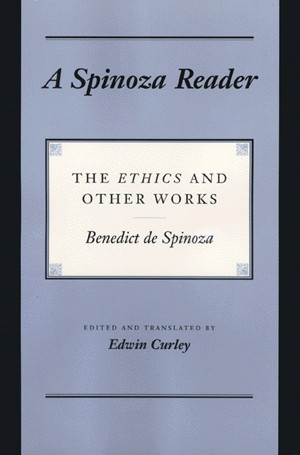Benedict de Spinoza: A Spinoza Reader: The Ethics and Other Works (1994)
Filed under book | Tags: · ethics, philosophy, religion, science

“This anthology of the work of Baruch de Spinoza (1632-1677) presents the text of Spinoza’s masterwork, the Ethics, in what is now the standard translation by Edwin Curley. Also included are selections from other works by Spinoza, chosen by Curley to make the Ethics easier to understand, and a substantial introduction that gives an overview of Spinoza’s life and the main themes of his philosophy. Perfect for course use, the Spinoza Reader is a practical tool with which to approach one of the world’s greatest but most difficult thinkers, a passionate seeker of the truth who has been viewed by some as an atheist and by others as a religious mystic.
The anthology begins with the opening section of the Treatise on the Emendation of the Intellect, which has always moved readers by its description of the young Spinoza’s spiritual quest, his dissatisfaction with the things people ordinarily strive for–wealth, honor, and sensual pleasure–and his hope that the pursuit of knowledge would lead him to discover the true good. The emphasis throughout these selections is on metaphysical, epistemological, and religious issues: the existence and nature of God, his relation to the world, the nature of the human mind and its relation to the body, and the theory of demonstration, axioms, and definitions. For each of these topics, the editor supplements the rigorous discussions in the Ethics with informal treatments from Spinoza’s other works.”
Edited and translated by Edwin M. Curley
Publisher Princeton University Press, 1994
ISBN 0691000670, 9780691000671
280 pages
PDF (11 MB, updated on 2021-6-23)
Comments (2)Quentin Meillassoux: After Finitude: An Essay on the Necessity of Contingency (2006–) [FR, EN, IT, ES, CR]
Filed under book | Tags: · contingency, critique, fideism, metaphysics, ontology, philosophy, religion, science, speculative realism, theology

“Quentin Meillassoux’s debut makes an original contribution to contemporary French philosophy and is set to have a significant impact on the future of continental philosophy. Written in a style that marries clarity of expression with argumentative rigour, After Finitude provides readings of the history of philosophy and sets out a critique of the unavowed fideism at the heart of post-Kantian philosophy.
The centrality of argument in Meillassoux’s writing should appeal to analytic as well as continental philosophers, while his critique of fideism will be of interest to anyone preoccupied by the relation between philosophy, theology and religion.
Meillassoux introduces a novel philosophical alternative to the forced choice between dogmatism and critique. After Finitude proposes a new alliance between philosophy and science and calls for an unequivocal halt to the return of religiosity in contemporary philosophical discourse.”
Publisher Seuil, 2006
ISBN 2020847426
English edition
Preface by Alain Badiou
Translated by Ray Brassier
Publisher Continuum, 2008
ISBN 0826496741, 9780826496744
148 pages
Après la finitude: essai sur la nécessité de la contingence (French, 2006, 6 MB, updated on 2021-3-15)
After Finitude: An Essay on the Necessity of Contingency (English, 2008, updated on 2020-5-26)
Dopo la finitudine: saggio sulla necessità della contingenza (Italian, trans. Massimiliano Sandri, 2012, added on 2021-3-15)
Después de la finitud: ensayo sobre la necesidad de la contingencia (Spanish, trans. Margarita Martinez, 2015, 5 MB, added on 2021-3-15)
Poslije konačnosti: esej o nužnosti kontingencije (Croatian, trans. Vladimir Šeput, 2016, added on 2020-5-26)
Dale F. Eickelman, Jon W. Anderson (eds.): New Media in the Muslim World. The Emerging Public Sphere, 2nd ed. (2003)
Filed under book | Tags: · internet, islam, mass media, middle east, new media, politics, religion

This second edition of a widely acclaimed collection of essays reports on how new media—fax machines, satellite television, and the Internet—and the new uses of older media—cassettes, pulp fiction, the cinema, the telephone, and the press—shape belief, authority, and community in the Muslim world. The chapters in this work, including new chapters dealing specifically with events after September 11, 2001, concern Indonesia, Bangladesh, Turkey, Iran, Lebanon, the Arabian Peninsula, and Muslim communities in the United States and elsewhere. The extent to which today’s new media have transcended local and state frontiers and have reshaped understandings of gender, authority, social justice, identities, and politics in Muslim societies emerges from this timely and provocative book.
Publisher Indiana University Press, 2003
Indiana series in Middle East studies
Edition 2
ISBN 0253216052, 9780253216052
213 pages

